

Medusa. Elfa Mio Cid. 23470SAN JUAN/SERPIENTES La Tragantía. Escrita por Juan Eslava Galán.
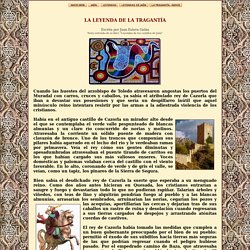
HIBRIDOS mujer serpiente. DIVINAS Y MONSTRUOSAS - Documents. Morgen (mythological creature) Morgens, morgans or mari-morgans are Welsh and Breton water spirits that drown men.
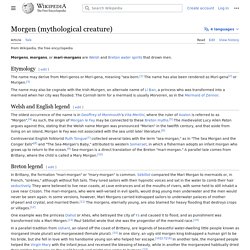
They may lure men to their death by their own sylphic beauty, or with glimpses of underwater gardens with buildings of gold or crystal. They are also blamed for heavy flooding that destroys crops or villages. In the story of the drowning of Ys, a city in Brittany, the king's daughter Dahut is the cause, and she becomes a sea morgen. Tales of morgens are preserved in the British countryside, even in some parts of South West England.
One example from western Somerset has a fisherman adopt an infant morgen, only to lose her when she grows up and returns to her parents' underwater palace.[4] Legend of the White Snake. The Legend of the White Snake, also known as Madame White Snake, is a Chinese legend which existed in oral tradition long before any written compilation.
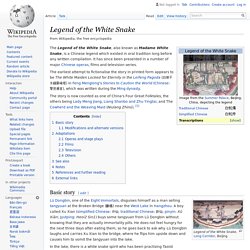
It has since been presented in a number of major Chinese operas, films and television series. The earliest attempt to fictionalise the story in printed form appears to be The White Maiden Locked for Eternity in the Leifeng Pagoda (白娘子永鎭雷峰塔) in Feng Menglong's Stories to Caution the World (Chinese: 警世通言), which was written during the Ming dynasty. The story is now counted as one of China's Four Great Folktales, the others being Lady Meng Jiang, Liang Shanbo and Zhu Yingtai, and The Cowherd and the Weaving Maid (Niulang Zhinü).
Basic story[edit] In the lake, there is a white snake spirit who has been practising Taoist magical arts in the hope of becoming an immortal after centuries of training and cultivation. Diorama at Haw Par Villa, Singapore, depicting the battle between Bai Suzhen and Fahai. Modifications and alternate versions[edit] Melusine. Melusine's secret discovered, from Le Roman de Mélusine by Jean d'Arras, ca 1450-1500.
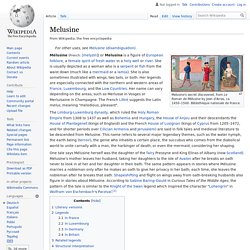
Bibliothèque nationale de France. Melusine (French:[melyzin] 'may-loo-ZEEN') (or Melusina) is a figure of European folklore, a feminine spirit of fresh waters in sacred springs and rivers. Literary versions[edit] Raymond walks in on his wife, Melusine, in her bath and discovers she has the lower body of a serpent. Illustration from the Jean d'Arras work, Le livre de Mélusine (The Book of Melusine), 1478. The most famous literary version of Melusine tales, that of Jean d'Arras, compiled about 1382–1394, was worked into a collection of "spinning yarns" as told by ladies at their spinning. The tale was translated into German in 1456 by Thüring von Ringoltingen, the version of which became popular as a chapbook. It tells how in the time of the Crusades, Elynas, the King of Albany (an old name for Scotland or Alba), went hunting one day and came across a beautiful lady in the forest.
Legends[edit] Melusina. El descubrimiento del Secreto de Melusina, de Le Roman de Mélusine.
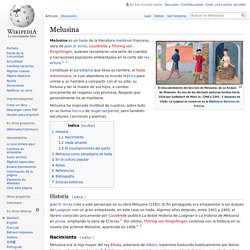
Es una de las dieciséis pinturas hechas hacia 1410 por Guillebert de Mets (n. 1390 ó 1391 - f. después de 1436). La original se conserva en la Biblioteca Nacional de Francia. Image Record. Knucker - Wikipedia, la enciclopedia libre. Knucker is a dialect word for a kind of water dragon, living in knuckerholes in Sussex, England.
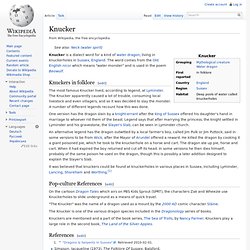
The word comes from the Old English nicor which means "water monster" and is used in the poem Beowulf. Knuckers in folklore[edit] The most famous Knucker lived, according to legend, at Lyminster. The Knucker apparently caused a lot of trouble, consuming local livestock and even villagers, and so it was decided to slay the monster. A number of different legends recount how this was done. One version has the dragon slain by a knight-errant after the king of Sussex offered his daughter's hand in marriage to whoever rid them of the beast. An alternative legend has the dragon outwitted by a local farmer's boy, called Jim Pulk or Jim Puttock, said in some versions to be from Wick, after the Mayor of Arundel offered a reward. El mito de Perseo y Andrómeda. En la mitología griega, Andrómeda era la bella hija del rey Cepheus y la reina Casiopea de Jaffa, un reino que los antiguos llamaban Ethiopía.
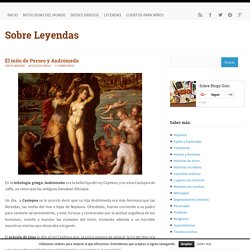
Un día, a Casiopea se le ocurrió decir que su hija Andrómeda era más hermosa que las Nereidas, las ninfas del mar e hijas de Neptuno. Ofendidas, fueron corriendo a su padre para contarle tal atrevimiento, y éste, furioso y contrariado por la actitud orgullosa de los humanos, mandó a inundar las ciudades del reino, enviando además a un horrible monstruo marino que devoraba a la gente. El oráculo de Zeus le dijo al rey Cepheus que, la única manera de aplacar la ira del dios era ofrecer a su hija Andrómeda en sacrificio.
Por eso, el regente ordenó que la encadenaran a las rocas del acantilado para que la bestia se la comiera. Y así se hizo. El mito de Jörmundagander y Thor. Dragón, el que mira fijamente.